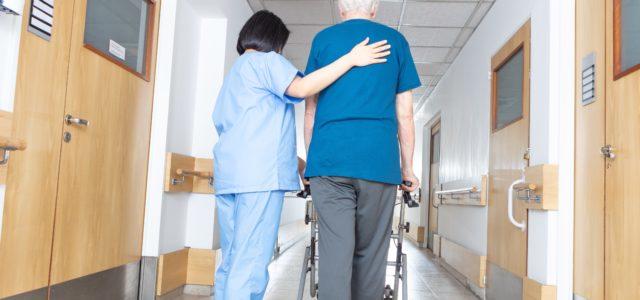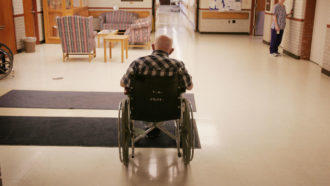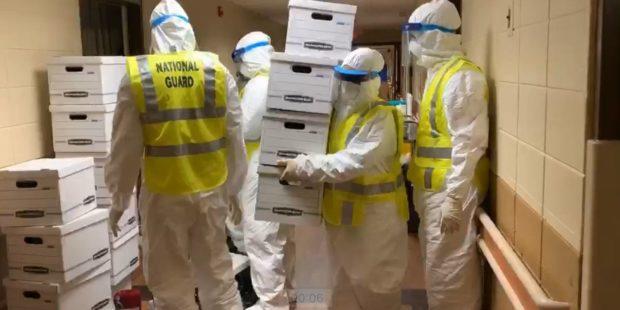
Caption
Georgia’s backlog surpassed those of every other state, exceeding the 76 percent in Maryland and Oregon, and easily topping the national average of 51 percent.
Credit: Georgia Health News/Stock photo

Georgia’s backlog surpassed those of every other state, exceeding the 76 percent in Maryland and Oregon, and easily topping the national average of 51 percent.
Georgia is last in the nation in conducting recertification inspections of its nursing homes, according to a recent media report.
By the end of March, nearly 80 percent of Georgia facilities had gone for at least 18 months without these comprehensive inspections, said the investigation report by CNHI, a newspaper company.
Georgia’s backlog surpassed those of every other state, exceeding the 76 percent in Maryland and Oregon, and easily topping the national average of 51 percent. The CNHI data follow similar findings on Georgia inspections by the Atlanta Journal-Constitution last fall.
Inspection delays didn’t escape the attention of lawmakers. The fiscal year 2022 budget contains more than $12 million to beef up the inspection workforce and conduct more timely reviews of nursing homes.

Recertification inspections are thorough reviews of a nursing home’s operations by trained teams, typically over four days.
More than $7 million of that funding is “to help reduce staff turnover and increase staffing to reduce the backlog of the surveys’’ within the Georgia Department of Community Health, state Rep. Terry England, chairman of the House Appropriations Committee, told GHN last week. The rest will pay for contract workers who “will help catch the backlog up.’’
“Just like in most state agencies, we are seeing a fairly high turnover rate among employees and areas within DCH,’’ England added.
Recertification inspections are thorough reviews of a nursing home’s operations by trained teams, typically over four days.
The CNHI investigation found that by March of this year, more than half of U.S. nursing homes had operated for at least 18 months without the required in-person annual recertification inspections, according to federal regulatory records. The lag in inspections and poor oversight predate the pandemic, and states struggled early on to pivot to infection control, the report said.
During the pandemic, regulators prioritized half-day reviews of infection control practices and staffing logs. And these inspectors let facilities be saddled with a “Special Focus Facility” rating — a designation reserved for the worst nursing homes in each state — for far longer than the 24-month suggested maximum, the CNHI report said.

Guardsmen cleaning a Mitchell County nursing home after a COVID outbreak last year.
During months of increasing spread of the virus, the ombudsman personnel were unable to visit nursing homes due to safety concerns.
“I still have concerns about what’s happening inside,’’ Melanie McNeil, the state’s long-term care ombudsman, told GHN last week. She cited potential problems in medication delivery, food service and wound care. “If you’re not watching, things can go badly.’’
The pandemic clearly devastated long-term care facilities. In Georgia, more than 4,000 residents of such facilities died from COVID-19.
In March 2020, federal regulators suspended routine certification inspections and low-level complaint responses in favor of emergency infection control surveys.
When asked about the lag in inspections, the Department of Community Health last week cited federal guidance that required officials “to prioritize COVID-related issues and immediate jeopardy complaints throughout the public health emergency.’’
DCH has completed over 2,000 inspections in nursing homes over the past year, the agency told GHN last week. “Now that COVID activity has decreased in nursing homes and fewer COVID-related surveys are required, the department has resumed recertification surveys,’’ a DCH spokeswoman, Fiona Roberts, said in a statement. “The department always works to prioritize facilities with the largest gap between recertification surveys and also gives priority to Special Focus Facilities. The department recognizes the importance of this work and remains committed to the protection and oversight of all long-term care residents.”
During COVID, nursing home visits by family and friends were restricted by facilities and by state governments, which cited the potential spread of disease within the facilities.
But problems other than infection control still occurred.
The AJC reported in September that at Dunwoody Health and Rehabilitation Center, family members described cases of malnutrition, unexpected deaths, unanswered phone calls and callous demands that the relatives immediately send funeral home personnel to pick up loved ones’ remains.
An industry trade group in Georgia said that the pandemic drew immediate attention to supplies of personal protective equipment and issues of infection control.
“While they may not have been physically present, state surveyors have been in frequent contact with centers,’’ said Devon Barill, a spokeswoman for the Georgia Health Care Association.
The state resumed recertification surveys in April.
“Understandably, it will take some time to return to a pre-pandemic schedule of surveys,” Barill said.
Conditions in nursing homes drew attention in the Georgia General Assembly, sparking proposed legislation over the use of cameras in residents’ rooms.
House Bill 605 promoted the installation of cameras in plain sight in the rooms of residents of long-term care facilities, to prevent neglect or abuse. It drew support from the long-term care industry.

But this so-called ‘‘granny cam’’ measure ran into trouble from legislators who believed that hidden cameras — unknown to a facility and its staff — should not face legal restrictions.
AARP, the Alzheimer’s Association, and the Georgia Council on Aging opposed HB 605 because they said it prohibited the use of footage from hidden cameras in a civil case or administrative procedure if abuse or neglect were to occur in nursing homes or other facilities.
The lobbying on both sides of the issue was fierce in the last few days of the 2021 legislative session Proponents of the bill argued that open, visible cameras would help protect patients and residents.
The legislation was amended in the state Senate, but still failed to make it through the final day of the session.
This story comes to GPB through a reporting partnership with Georgia Health News.